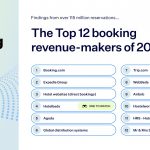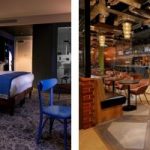Filling up as many rooms as possible with the most optimized pricing for each room has always been the main focus of the traditional hotelier.
NB: This is an article from Agilysys
While revenue per available room (RevPAR) has been the most common metric to hotels in the past, today they are finding revenue per available guest (RevPAG) to be even more important. Instead of solely looking at the occupancy (OCC) and average daily rate (ADR) for one room, now properties are looking more closely at the guest (or guests) that reserve these rooms, what they are interested in, and how to capitalize on those interests and capture more of their spend.
Subscribe to our weekly newsletter and stay up to date
As The American Hotel & Lodging Association 2022 State of the Hotel Industry Report in Collaboration with Accenture reported, hotels are still recovering from a collective $111.8 billion in room revenue lost in 2020 and 2021. These properties are not only trying to recover revenue lost over the last two years, but they must also identify new streams to capture revenue beyond the room.
What Today’s Guests Want
It’s important for hotels to understand guest behavior from two perspectives: propensity and affinity. Propensity typically refers to a tendency or preference – something a guest is inclined to do. Jane, as a business traveler, is likely interested in ground transportation and high-speed internet. Affinity however, refers to an interest affected by a connection. In this case, if Jane is traveling with her husband and their children, she may be interested in paying more for connected rooms, activities that apply to different ages, special events, and ancillary services that apply to families. Retailers have been using a technique called market basket analysis for many years to increase sales and capture more revenue by better understanding customer purchasing patterns. If hospitality organizations start looking at their guests using these perspectives, they might be surprised how much they can learn about their preferences to predict behavior and open a door to new revenue streams.
According to the AHLA study, “2022 is the year of the ‘new’ traveler.” The study found that travelers’ interests have shifted, and hotels must be equipped to understand and respond to their expectations. Bleisure travel – combining business travel with leisure travel – has exploded with more employees working remotely, and hotels are now forced to focus more on other service offerings to accommodate them.
“Consumers’ motivations, behaviors, and expectations all shifted during the pandemic-profoundly changing how hotels operate to satisfy their guests, who are increasingly likely to be leisure or bleisure travelers or digital nomads,” the AHLA study explained. “As a result, technology will be even more critical in a property’s success.”
With these changes in behavior, hotels must have technology solutions in place to facilitate ancillary bookings, understand these preferences, optimize the required staff to fill them, and help staff maintain consistent service levels. “Hotels will need to make structural changes in how they attract, convert, and retain leisure customers,” the study stated. “Compared to business travelers, leisure travelers want more guidance for the booking process and more information about the destination. They buy very differently than business travelers. It’s less about specifics and convenience as it is about adding services on the fly after the initial booking in the spirit of discovery and adventure.”
A recent post by QuestionPro revealed that when you look at millennial travelers specifically, they are more spontaneous, they are taking more trips during the year, they are taking longer trips, and they are taking more time to plan those trips. The survey showed that 61 percent of millennials are traveling between five and seven times per year, while approximately 65 percent of Generation X and 70 percent of Baby Boomers vacation once or twice each year.
While millennials are traveling more frequently than other age groups, as the 2022 Global Travel Trends Report by American Express Travel notes, travelers of all ages are focusing more on experiences, sustainability efforts, and connecting with local communities. Hotel properties must be creative in what they offer their guests, leverage all of their departments that affect the guest experience, and link them all to the guest’s preferences and history to provide them with unique experiences and exceptional service. When hotels have a better understanding of these trends and travel habits through technology solutions built for the hospitality industry, they stay ahead of their competition, attract more guests, create more personalized experiences, and capture more revenue.
One property that has enlisted the help of technology to better understand its guests is Big Cedar Lodge. The property overlooks Table Rock Lake in the Missouri Ozark Mountains and was created by Bass Pro Shops founder, Johnny Morris, as a destination for guests and their families to connect with the great outdoors. With a property spanning 40,000 acres and including 351 guest rooms, two full-service marinas, five golf courses, a 50,000-square-foot activity enter, shooting academy, spa, multiple restaurants, and three other standalone properties totaling 263 additional guest rooms, the Big Cedar team is focused on learning about its guests and providing them with unique experiences tailored to their interests. “Our overarching mission is to create one-of-a-kind experiences for our guests while surrounded by nature and rustic elegance,” said Beth Zahner, director of operations for Big Cedar Lodge. “With this goal in mind, we track guest behavior to further develop and enhance their overall experience.”
With the help of technology, properties like Big Cedar Lodge are able to create a full, single view of their guests and find ways to maximize the return on guest experience by understanding what they are interested in and making them aware of all the property has to offer. The property’s staff can customize activities and services to create memorable trips for these guests simply by having an inside view of their preferences.
How Hotels Can Learn More About Their Guests, Create New Revenue Streams, and Capture More of Their Spend
Hotels have the ability to identify different customer segments and provide unique offerings that are relevant to each. A robust booking engine that ensures guests have access to review the many services, amenities and activities that a property offers in advance of their stay and throughout their journey allows them to further personalize their visit. When hotels make it easy for guests to upgrade a room, book activities like spa services and golf tee times, or make dining reservations and even pick the table, seat and server of their choice, they are providing conveniences to the guest that elevate their experience and create new opportunities for the property to capture more revenue.
Through digital marketing tools, the hotel can send pre-arrival or welcome messages to their guests including personalized offers, specials, and suggestions based on availability to maximize the total gross operating profit per room. When the hotel team has access to a guest’s profile and is familiar with their preferences and interests, these offers are customized for them, and create a higher rate of engagement. Guests are far more likely to accept an offer or react to a notification if it is catered to their specific interests.
Properties like Big Cedar Lodge are finding that by staying connected with guests, they can provide them with personalized information about their unique facilities and what they have to offer. “We utilize data to provide better guest service, suggest unique and customized experiences, and to help anticipate guest needs and desires,” added Zahner. “This approach, which gives great attention to detail, produces a greater return and better guest experience overall.”
When hotels have a flexible and scalable property management system (PMS), staff members have access to guest history and can predict behavior. By providing staff members from different departments with more information through a single guest itinerary, they can create special offers and keep the guest on-site. A spa therapist who is aware of the guest’s golf round the previous day can offer and upsell a specific foot massage, or another staff member can offer Champagne to the couple who has indicated they are celebrating their anniversary – this information is all stored in the PMS and is accessible by staff members to help provide a more personalized experience and encourage upsell opportunities.
Additionally, hotels need to retain their strongest staff members to maintain elevated service levels and successfully compete with other properties. By providing staff with the tools to access a 360-degree view of their guests and solutions that automate manual tasks thereby creating more time for them to engage in value-added tasks, job satisfaction increases and service levels improve.
Today, increasing competition and intermediary commissions are forcing hoteliers to think ahead to capture more non-room-related revenue opportunities. These hotels are widening their offerings to generate new revenue and are taking into account unique property or local features including restaurants, nightclubs, salons, bars, retail shops, as well as special event and concert venues. They are creating exceptional experiences for guests and ensuring zero disappointment – a crucial factor in hospitality. Even one negative experience against 100 exceptional experiences will affect guest impression and reputation.
Hotel properties that invest in technology to better understand their guests will see increased revenue, better guest reviews, and will experience a higher return on both guest and staff experience. The most successful hotel properties have learned to focus more on their guests and their interests and less on their rooms.
Read more articles from Agilysys
Originally posted by the Hotel Business Review with permission from www.HotelExecutive.com
The post Understand Today’s Guest and Capture Revenue Beyond Rooms appeared first on Revenue Hub.
































